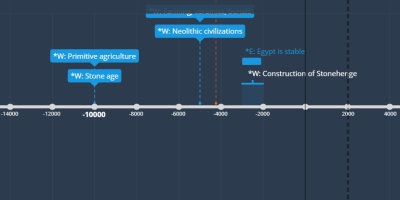Islamic Golden Age (1 janv. 800 – 1 janv. 1258)
Description:
The Arab civilization traditionally marks its beginning from the year 622 CE the date when Muhammad, threatened with assassination, fled from Mecca to Medina where Muhammad and his followers found safety and respect. Over a century later, the Arabs had established themselves as a powerful unified force across large parts of the Middle East. The Caliph Abu Ja'far Al-Mansour established the city of Baghdad around 760, and sent emissaries to search for and collect knowledge. From China, they learned how to produce paper, and using this new skill they started a program of translation of texts on mathematics, astronomy, science and philosophy into Arabic.Al-Mansour founded a scientific academy that became called 'The House of Wisdom'. This academy attracted scholars from many different countries and religions to Baghdad to work together and establish the traditions of Arabic science that were to continue well into the Middle Ages. Some of this work was later translated into Latin by Mediaeval scholars and passed on into Europe. The dominance of Baghdad and the influence of the Arab World lasted for the next 500 years.
Around 900 –1100 many religions and races coexisted in Iberia, each contributing to the culture. The Muslim religion was generally very tolerant towards others, and literacy in Islamic Iberia was more widespread than any other country in Western Europe. By the 10th century Cordoba was said to have equally good libraries and educational establishments as Baghdad, and the cities of Cordoba and Toledo became centers of a flourishing translation business.
Ajouté au bande de temps:
Date:
1 janv. 800
1 janv. 1258
~ 458 years
